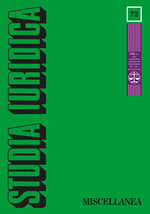Świadczenie niegodziwe – trudne dziedzictwo rzymskiej
inspiracji
The Immoral Performance – a Difficult Heritage of a Roman Inspiration
Author(s): Wojciech DajczakSubject(s): History of Law
Published by: Wydawnictwa Uniwersytetu Warszawskiego
Keywords: unjustified enrichment; condictio of turpem causam; good faith; Roman law tradition; bezpodstawne wzbogacenie; condictio of turpem causam; dobra wiara; tradycja prawa rzymskiego
Summary/Abstract: Incorporating the rules inspired by the Roman condictio ob turpem causam into modern regulations of unjustified enrichment provokes criticism. Such regulations are diversified into several models but mostly invoke controversies. The main goal of this paper is evaluating these critical opinions and doubts repeated in legal discourse using historical and comparative methods. Author focuses on five issues: usefulness of condictio ob turpem causam in the light of works of ius commune jurists; doubts concerning the principle in pari turpitudine melior est conditio possidentis; different approach of various European legislators to the idea of condictio ob turpem causam; relation between regulations of unjustified enrichment and unenforceability of agreements contrary to the o law and good customs; importance of the restitution of payments contrary to the law and good customs for today’s legal practice. The conclusions of such analysis allow to admit that doubts concerning the continuation of the Roman condictio ob turpem causam are justified. From the other side, in times of multicultural societies and increasing number of legal regulations the growth of disputes resulted from the payments contrary to law and good customs can be observed. The rejection of repayment based on the contrary to the objective good faith offers – according to the author – the best compromise between weak points of Roman condictio ob turpem causam and challenges of modern practice. In the legal reasoning it is expressed by the maxime „no one shall be heard, who invokes his own guilt”.Incorporating of this maxime into the unjustified enrichment is all the more justified when higher could be in legal practice doubts concerning the acceptability of rejection of restitution of the payment with has been made without legal ground but in the contrary to the principle of good faith.
Journal: Studia Iuridica
- Issue Year: 2018
- Issue No: 72
- Page Range: 101-119
- Page Count: 19
- Language: Polish

